 Understanding Mental Distress
Understanding Mental Distress Book contents
- Frontmatter
- Dedication
- Contents
- List of tables
- List of abbreviations
- Notes on the author
- Acknowledgements
- Introduction
- PART I Sociohistorical contexts of policy and practice
- PART II Lived experiences of neoliberal reform
- PART III Theorising knowledge and practice
- Conclusion
- Appendix: methodology
- Notes
- References
- Index
- Frontmatter
- Dedication
- Contents
- List of tables
- List of abbreviations
- Notes on the author
- Acknowledgements
- Introduction
- PART I Sociohistorical contexts of policy and practice
- PART II Lived experiences of neoliberal reform
- PART III Theorising knowledge and practice
- Conclusion
- Appendix: methodology
- Notes
- References
- Index
Summary
This appendix will provide a brief overview of the study's methodology. The broad aims of the study were to explore the impact of policy and organisational reforms implemented within Community Mental Health Teams (CMHTs) on the articulation and negotiation of differing conceptualisations of mental distress. Participant observation utilising a ‘reflexive ethnography’ approach (Davies, 2008) formed the primary research method for this particularistic (small-group) ethnographic study. Additional methods included semi-structured qualitative individual and group interviews, and document analysis.
Data collection was carried out in two phases. Having obtained ethical clearance from the relevant NHS Research Ethics Committee, an initial eight-week pilot study was carried out in a CMHT within a large urban NHS Foundation Trust during 2008. However, it was not possible to continue data collection there for organisational reasons, and so a second team within the same NHS Trust was selected for the full-scale stage of the study. The first full-scale phase of fieldwork was, therefore, carried out between 2009 and 2011. I collected data by immersing myself in the daily routines and functioning of the teams in order to observe everyday practices. The latter included the individual and group casework meetings of practitioners with service users, and multiprofessional fora such as Care Programme Approach (CPA) meetings, inpatient ward rounds and weekly CMHT meetings. In total, I carried out 12 months of data collection utilising participant observation over a three-year period. Following this, I conducted 27 in-depth semi-structured interviews with 19 practitioners based at Southville CMHT and the wider Trust, and eight service users and three carers linked to the CMHT.
During the ethnographic fieldwork, data were recorded in several formats. Scratch notes were handwritten contemporaneously, while at the end of each day detailed field notes and reflective memos were typed up. I audiorecorded and transcribed some meetings and ward rounds, and all individual and group interviews conducted during both phases of the study.
The selection of the fieldwork setting for phase one involved both theoretical and pragmatic considerations. A statutory CMHT was chosen as an appropriate setting to address the research topic because this type of team has been the mainstay of community mental health provision and a number of occupational groups work together within an integrated team framework.
- Type
- Chapter
- Information
- Understanding Mental DistressKnowledge, Practice and Neoliberal Reform in Community Mental Health Services, pp. 217 - 219Publisher: Bristol University PressPrint publication year: 2022


